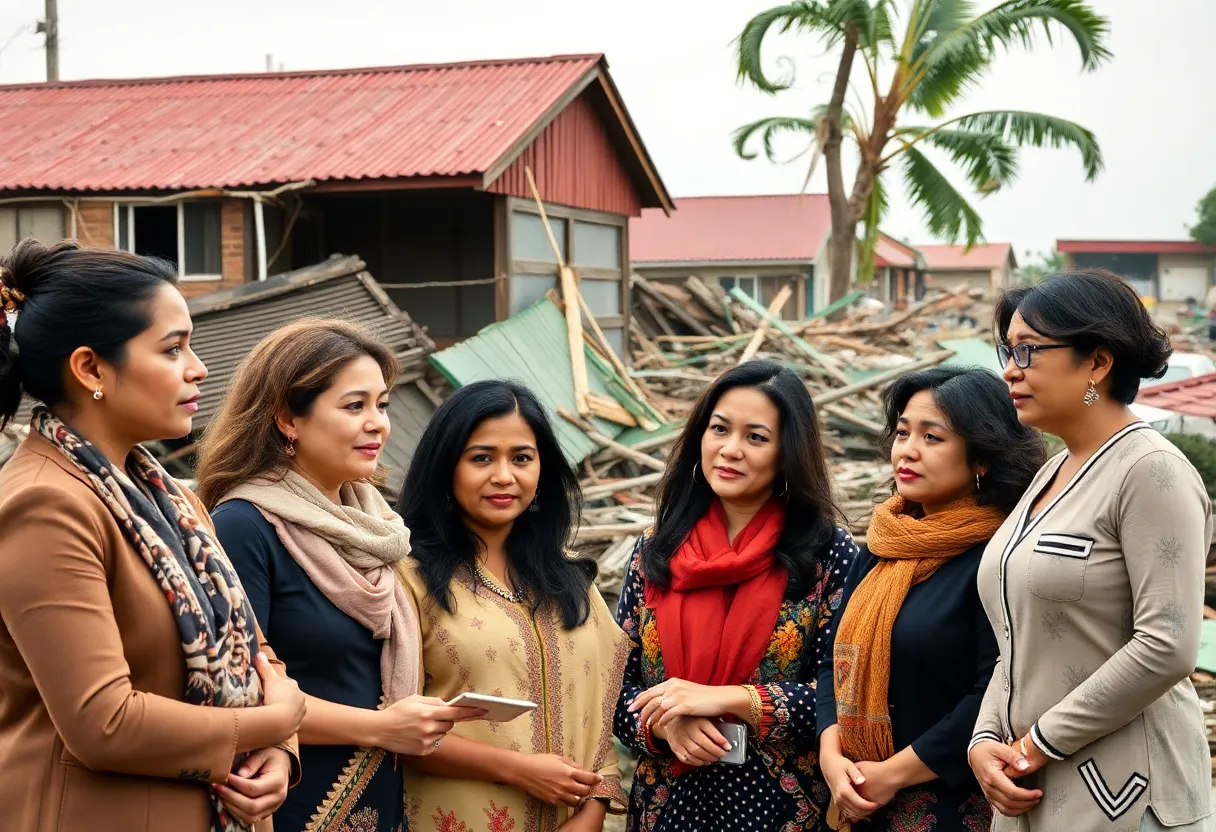News Summary
Asheville FM’s Voices series highlighted the crucial intersection of women’s involvement in climate research and the impact of climate-related disasters. A diverse panel, including North Carolina State Senator Julie Mayfield, emphasized the need for urgent action following Hurricane Helene’s devastation in Western North Carolina. With a commitment to support recovery efforts, Asheville FM announced donating 80% of ticket sales to local organizations aiding those affected. Experts called for a holistic approach to community resilience, stressing social equity as essential in disaster recovery planning amidst increasingly severe climate threats.
Asheville – Local radio station 103.3 Asheville FM held its third Voices series event, emphasizing the intersection between women’s roles in climate change research and the ongoing impacts of climate-related disasters. The panel brought together experts and advocates to discuss the urgent need to address climate change, especially in the aftermath of Hurricane Helene, which recently caused significant damage to Western North Carolina.
Among the key speakers was North Carolina State Senator Julie Mayfield, who shared insights from her journey of growing up in Western North Carolina to becoming a prominent advocate for clean energy policies. Her experiences highlight a personal commitment to tackling climate issues head-on.
Bob Hanna, the lead organizer of the event, stressed the moral imperative to take action against climate change, calling attention to its direct effects on local communities. In a gesture of solidarity, Asheville FM announced plans to donate 80% of ticket sales from the event to two organizations dedicated to recovery efforts in vulnerable communities impacted by Hurricane Helene. Beneficiaries include the River Arts District and Swannanoa Communities Together, both pivotal in aiding local recovery initiatives.
The recent Hurricane Helene has disrupted the perception of Asheville as a climate haven. Historically regarded as a secure environment with a moderate climate, the recent storms have raised serious concerns about the area’s vulnerability to climate disasters. David McConville, a data visualization designer, criticized the idealization of Asheville as an invulnerable area, linking it to observable patterns of increased flooding and damage.
Dr. Jesse Keenan from Tulane University shared insights on the notion of climate havens, positing that no region can claim immunity from the impacts of climate change. His perspective aligns with the increasing severity of climate incidents, questioning the sustainability of such assumptions in future planning.
The panel also featured Dr. Jola Ajibade from Emory University, who highlighted the necessity for a holistic approach to community resilience. This includes not only strengthening infrastructure but also prioritizing social equity to ensure that recovery efforts do not overlook marginalized groups. Discussions during the event reinforced the significance of long-term planning and investment in disaster resilience, emphasizing that preparation must occur before emergencies arise.
Reports indicate that resilient infrastructure can often be costly, posing challenges for numerous communities striving to protect their residents. The panelists collaboratively pointed out that adaptation strategies should take into account the varying needs of affected populations, with a focus on preserving human life and fostering lasting investments that enhance community safety.
Relocation was discussed as a feasible adaptation strategy for communities that face repeated weather-related disasters, prompting considerations about the need for effective recovery planning that incorporates community engagement and resource accessibility.
The challenges posed by recent hurricanes highlight an urgent duty for cities to develop infrastructure capable of withstanding increasingly severe climate threats. Moreover, concerns have been raised regarding the influence of the private sector in shaping community resilience and the affordability of living in areas prone to environmental risks.
As Asheville continues to experience the real-time effects of climate-related events, the discussions at the Voices series event serve as a powerful reminder of the increasing urgency to address climate change proactively and equitably.
Deeper Dive: News & Info About This Topic
HERE Resources
Asheville Hosts ‘Good Trouble Lives On’ Protests
California Governor Sues Fox News for Defamation
UK and US Leaders Finalize Major Trade Agreement
UNC Asheville Dismisses Dean Over DEI Policy Comments
House Republicans Propose Massive $4.9 Trillion Tax Breaks
New York’s Budget: Changes and New Powers for Governor Hochul
U.S. House Challenges California’s Environmental Authority
Corporate Sponsorships Transform White House Easter Egg Roll
President Trump’s Tariff Policies Under Review
Trump Announces Major Tariffs: What You Need to Know
Additional Resources
- WLOS: Asheville FM Hosts 3rd Voices Series
- Science Friday: Asheville Climate Haven Risks
- New York Times: Asheville and Climate Change Flooding
- ABC News: Asheville’s Climate Change Safe Havens
- Fast Company: Asheville as a Climate Haven

Author: STAFF HERE ASHEVILLE WRITER
The ASHEVILLE STAFF WRITER represents the experienced team at HEREAsheville.com, your go-to source for actionable local news and information in Asheville, Buncombe County, and beyond. Specializing in "news you can use," we cover essential topics like product reviews for personal and business needs, local business directories, politics, real estate trends, neighborhood insights, and state news affecting the area—with deep expertise drawn from years of dedicated reporting and strong community input, including local press releases and business updates. We deliver top reporting on high-value events such as the Asheville Bread Festival, LEAF Festival, and mountain sports tournaments at Biltmore Estate. Our coverage extends to key organizations like the Asheville Area Chamber of Commerce and Explore Asheville Convention & Visitors Bureau, plus leading businesses in hospitality and brewing that power the local economy such as the Biltmore Estate and Sierra Nevada Brewing Company. As part of the broader HERE network, including HERECharlotte.com, HEREGreensboro.com, HERERaleigh.com, and HEREOBX.com, we provide comprehensive, credible insights into North Carolina's dynamic landscape.





